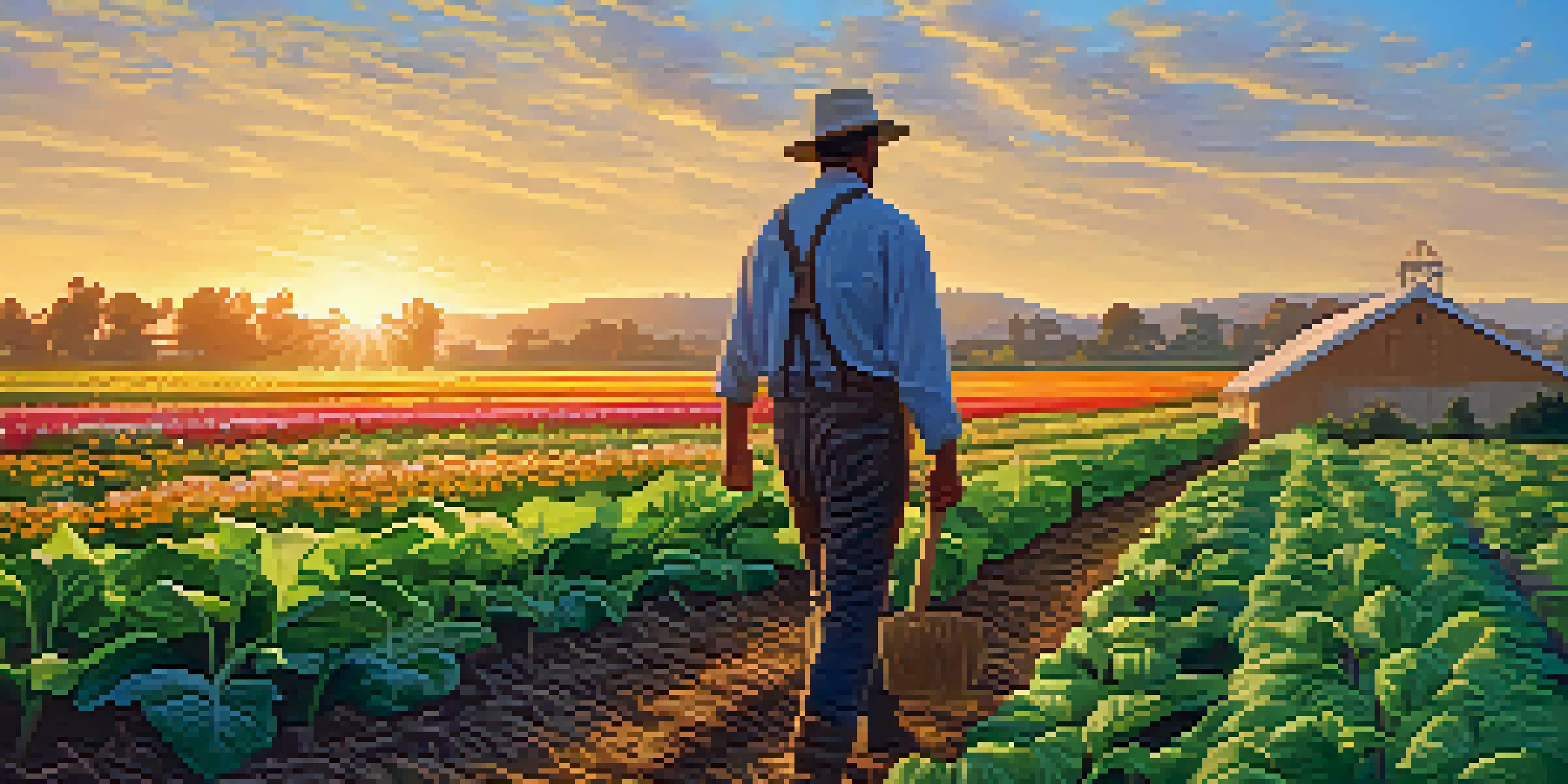Sustainable Agriculture: The Role of Plant Biotechnology

Understanding Sustainable Agriculture and Its Importance
Sustainable agriculture is all about meeting our present food needs without compromising future generations' ability to do the same. It emphasizes practices that are environmentally friendly, economically viable, and socially responsible. This holistic approach aims to balance the demands of food production with the health of our planet.
Sustainable agriculture is a way of farming that focuses on producing food that is healthy for consumers and the environment.
By focusing on sustainability, farmers can improve soil health, conserve water, and reduce the use of harmful chemicals. These practices not only protect the environment but also enhance food security, making it a crucial topic in today's agricultural discussions. The challenge lies in implementing these sustainable methods while continuing to meet the growing global population's food demands.
Plant biotechnology plays a vital role in this equation, offering innovative solutions that can enhance crop resilience and productivity. Through genetic modifications and other advanced techniques, biotechnology helps create crops that are better suited to withstand climate change and pests, ultimately supporting sustainable agricultural practices.
Plant Biotechnology: A Tool for Sustainable Farming
Plant biotechnology encompasses a range of techniques used to improve plants, including genetic engineering, molecular markers, and tissue culture. These methods enable scientists and farmers to develop crop varieties that require fewer resources while maximizing yield. For example, drought-resistant crops can thrive in arid conditions, reducing the need for extensive irrigation.

One of the most significant benefits of plant biotechnology is its ability to reduce the reliance on chemical pesticides. By developing crops that are naturally resistant to pests, farmers can minimize the use of harmful chemicals, leading to healthier ecosystems. This approach not only benefits the environment but also aligns with consumer preferences for organic and sustainably grown food.
Sustainable Agriculture Benefits Us All
Sustainable agriculture meets current food needs while ensuring future generations can also thrive by promoting environmentally friendly and socially responsible practices.
Moreover, biotechnology can enhance nutritional content in crops, addressing issues like malnutrition in vulnerable populations. By fortifying staple crops with essential vitamins and minerals, we can make strides toward global food security while promoting sustainable agricultural practices.
The Role of Genetic Engineering in Crop Improvement
Genetic engineering is a powerful aspect of plant biotechnology that allows scientists to directly modify an organism's DNA. This precision enables the development of crops with desirable traits, such as increased yield, disease resistance, and improved nutritional profiles. For instance, scientists have engineered rice varieties that contain higher levels of vitamin A, combating deficiencies in regions where rice is a staple.
Biotechnology is a powerful tool that can help us meet the challenges of feeding a growing global population while protecting the environment.
The advantages of genetic engineering extend beyond crop performance; it also helps farmers adapt to changing climate conditions. By creating plants that can endure extreme weather events, such as droughts or floods, farmers can maintain productivity even in challenging environments. This adaptability is crucial as climate change continues to impact global agriculture.
However, the use of genetic engineering often sparks debate about safety and ethics. Clear communication about the benefits, along with stringent regulatory frameworks, is essential to foster public trust and acceptance of genetically modified organisms (GMOs) in the marketplace.
Biotechnology's Impact on Soil Health and Fertility
Healthy soil is the foundation of sustainable agriculture, and biotechnology plays a significant role in enhancing soil health. Certain biotechnological solutions, like biofertilizers and biopesticides, help improve soil fertility without the adverse effects associated with synthetic fertilizers. These natural alternatives promote beneficial microorganisms in the soil, making it more productive and resilient.
Additionally, genetically modified crops can be designed to reduce soil erosion and enhance carbon sequestration. For example, deep-rooted plants can stabilize soil structure, preventing erosion while improving its ability to store carbon dioxide. This dual benefit supports both agricultural productivity and environmental health.
Biotechnology Enhances Crop Resilience
Plant biotechnology provides innovative solutions, such as drought-resistant crops, that improve agricultural productivity and address food security challenges.
By prioritizing soil health through biotechnological innovations, farmers can cultivate more sustainable practices that lead to long-term agricultural success. Healthy soil not only produces better yields but also contributes to overall ecosystem stability.
Addressing Food Security Through Biotechnology
Food security is a pressing global challenge, and biotechnology offers promising solutions to address it. With the world population expected to reach 9 billion by 2050, enhancing food production efficiency is critical. Biotechnology can help increase crop resilience, allowing farmers to produce more food on the same amount of land.
Moreover, biotechnology enables the development of crops that are less susceptible to diseases and pests, reducing crop losses and ensuring a stable food supply. For example, genetically modified crops like Bt cotton have shown significant reductions in pest-related damage, leading to higher yields and better income for farmers.
By integrating biotechnology into agricultural practices, we can work towards a future where food is abundant, accessible, and sustainable. This approach not only addresses immediate food security concerns but also promotes long-term resilience in food systems.
Consumer Perception and Acceptance of Biotech Products
The acceptance of biotech products among consumers is a crucial aspect of their success in the market. Many people have concerns about the safety of genetically modified foods, often stemming from misinformation. It's essential to educate consumers about the rigorous testing and regulatory processes that biotech products undergo before reaching their plates.
Engaging storytelling and transparent communication can help bridge the gap between science and consumer perception. For instance, sharing success stories of farmers using biotech crops to improve yields and reduce environmental impact can resonate with consumers and help alleviate concerns.
Consumer Trust is Key for Biotech
Educating consumers about the safety and benefits of biotechnology in agriculture is essential for fostering acceptance and promoting sustainable farming practices.
Ultimately, fostering an informed dialogue about biotechnology in agriculture is vital for its acceptance. As consumers become more aware of the benefits and safety of biotech products, they may be more likely to support sustainable agricultural practices that incorporate these innovations.
The Future of Sustainable Agriculture with Plant Biotechnology
As we look to the future, the integration of plant biotechnology in sustainable agriculture appears promising. Continued advancements in genetic engineering, data science, and sustainable practices are paving the way for more resilient food systems. Biotech innovations will likely play a crucial role in addressing the challenges posed by climate change, population growth, and dwindling resources.
Collaboration among scientists, farmers, policymakers, and consumers will be essential for unlocking the full potential of plant biotechnology. By working together, we can create a more sustainable agricultural landscape that benefits both people and the planet. This cooperative approach ensures that innovations are developed responsibly and that their benefits are widely shared.

In conclusion, the role of plant biotechnology in sustainable agriculture is pivotal for achieving a balance between food production and environmental stewardship. By harnessing these advanced techniques, we can cultivate a healthier future for all.